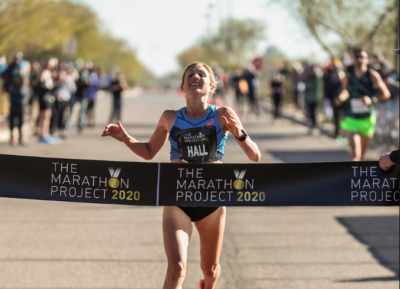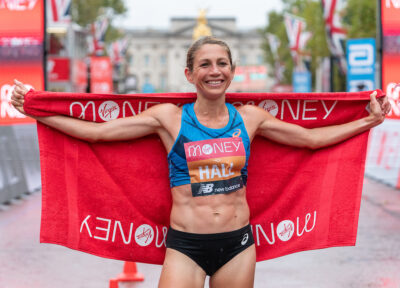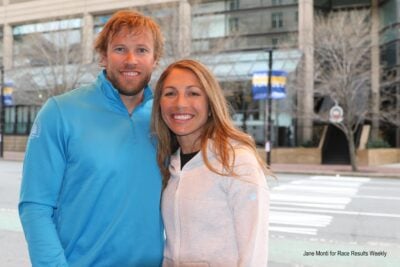Ryan Hall Q&A: “For Sara, Winning the Chicago Marathon Would Be More Meaningful Than Setting an American Record”
By Jonathan Gault
October 7, 2021
We are just three days out from the 2021 Bank of America Chicago Marathon. The biggest pre-race storyline for many was Sara Hall chasing Deena Kastor‘s American record of 2:19:36, which has stood for over 15 years. That was the goal after Hall finished second at the London Marathon last year in a pb of 2:22:01, then ran 2:20:32 at the Marathon Project to become the second-fastest American female marathoner in history. But right now, the weather forecast for Sunday in Chicago (high of 80 degrees with 10-20 mph winds) isn’t cooperating.
Hall’s coach and husband Ryan — who ran 2:08:04 himself in Chicago to finish 5th in 2011 — is well aware of the forecast, but says that place, rather than time, has always been Sara’s primary focus for this race. Could she become the first American woman to win Chicago since Kastor in 2005? Ryan Hall spoke to LetsRun.com in a phone interview Thursday to talk about Sara’s preparation, her result at Cherry Blossom last month (Sara called it “rough“; Ryan was more sanguine), and how he thinks she will handle the heat on Sunday.
LRC: How does her buildup compare to the one she had for London and the Marathon Project last year?
RH: It’s gone just according to schedule. It’s pretty crazy how consistently she’s just gotten her threshold down, which is obviously the big indicator we’re looking at with marathon fitness. Every single buildup, she seems to just be running two to four seconds quicker [per mile], which is quite a big improvement. When you translate that to a marathon, that turns into a couple minutes. So she’s definitely done workouts that she’s never been able to do before and [she’s] super confident, feeling great.
Obviously, we’ve been like everyone and had our close eye on the weather. You sign up for Chicago, you know you’re rolling the dice a little bit. Mid-October in Chicago, you know the weather can go either way. Obviously, we were hoping for that perfect weather day: cool, crisp morning, similar to what we had at the Marathon Project, great day to run there. It’s not looking like it’s going to be that kind of day, but still so much opportunity.
I was kind of miffed about this, because I’m a time guy, I want to go run fast and that’s always what I was about in my career and I take that into my coaching as well, where I’m very time-oriented, typically. But Sara’s always actually [been] more excited to compete in this one and take a swing at trying to podium and maybe even win the race. That was always her A1 goal. Because I asked her one time, what are you more excited about, trying to set the American record or trying to win the race? And she said, ‘Win the race.’ And I said, What? You’re crazy! We’ve gotta go after this American record.
So it’s been kind of nice even knowing that the weather could go in our favor, it could not, and anywhere in between, knowing that there’s a dual purpose. There’s the competitive purpose and trying to run really gritty, like Sara likes to do. That’s classic Sara, just getting herself in a gritty race and just compete similar to what she was able to do in London last year.
But also there was this thing of going after a fast time. And I’d say going after a fast time is more shifting towards the back burner of what we’re looking at doing now looking at the current weather conditions. But still, anything is possible, right? If the weather changes before, or if she’s really, really on and feeling great…
If you’re trying to break a record that’s stood for as many years as Deena’s record, you need the right day. It needs to be pretty perfect. I still think you can run really well in these temperatures, but it’s certainly going to slow people down, so we have to take that into account heading to the start line and be smart.
I really think, these kind of conditions, you’ve gotta be really intuitive. The Marathon Project was a perfect day, we knew exactly what to expect and we could just go out at 69:30 pace and take it there. There weren’t really a lot of variables that were outside our control. Looking at Chicago, it’s going to be one of those things where she just needs to get out there and see how she’s feeling in those conditions and then make the most of how she’s feeling and the opportunities that play out around her, similar to London last year.
Are there going to be pacemakers? And do you know what the pace is going to be at halfway that she’ll be trying to hit?
She has three pacemakers, two of which are supposed to go the whole way. Our initial thing was to go out in 69:45. I can say that will be adjusted now. I don’t know how fast she’s going to go out. It’s just going to have to be so fluid out there based on the day, how she’s feeling, what the wind is doing, what the actual temperatures are. Because you look at the weather, it can change moment by moment.
I think we’ll send her out right around that 5:20-5:25 pace (Editor’s note: 5:25 pace is 2:22:01 pace, 5:20 pace is 2:19:50), probably, which is slower than we were originally planning on and then she’s just going to have to adjust the pace based on how she’s feeling.
You mentioned the record attempt might not be as big of a focus because of the weather, but I’m curious, because that was the goal going into the preparation and the Marathon Project was also an American record attempt. Was there anything you learned from preparing for the Marathon Project, preparing to run that fast, that you guys incorporated into this buildup?
Not necessarily, no. We did stretch out some of her long runs longer than she’s gone before. Before, the longest we’d go was 2:30. Now we’ve stretched them out to 2:45. We did some back-to-back long efforts. Before Cherry Blossom, she ran 27 miles really hard, a really good, hard effort both those weekends prior to that race, which was why she was a little bit flat heading into that one. Or a lot flat, actually. So we did make some adjustments. She’s going a little bit further on back-to-back weekends, which she’d never done before.
Something we did prior to the Marathon Project that I wish we could have done for this race but we can’t because of training in the fall/summer is we dropped down on the Marathon Project course and did a lot of runs at sea level — long thresholds, marathon simulations, long runs, that kind of thing — on the course, at pace. And I love doing that. I felt like that was good for her legs to spend a long time working at marathon pace without having to break it up like you do at altitude.
And also from a psychological standpoint, just being like, hey, I’ve done all these long runs, 18 miles at 5:19 pace, I know exactly what this feels like, I know I can do it, there’s no question about it. Whereas if you’re dropping [into a race straight] from altitude, there’s always a little bit of a question mark, like, yeah, my thresholds are way better but I haven’t actually been running 5:19, 5:18 pace for 16 miles without stopping.
So I wish we could [have done that earlier] but with Phoenix, the temperatures are still hot. But she’s actually been down here adjusting to warmer weather. Whatever we get in Chicago, I want it to feel cooler than what she’s used to. And training up in the mountains, we’re used to dry, cold conditions pretty much all the time. So I just want, psychologically, for her to be on the start line and be like, this feels good, this feels cold, rather than like, oh, this feels 20 degrees warmer than what I’m used to. So she’s been in Phoenix the last few weeks just getting used to the warmer temperatures.
Has she had any injuries or any interruptions to her training?
She had a little niggle a week ago but nothing that caused her to miss anything. She’s totally good now. She’s been seeing John [Ball] down here in Phoenix as well. So her legs have never felt as good as they’re feeling, is what she’s been telling me. She’s been doing some easy runs getting down into the low-6:00, mid-6:00 range on easy runs just feeling really good. So she didn’t miss any big workouts.
And what was the niggle? Where exactly was that on her body?
She just had a little bit of tightness where the hamstring attaches to the back of the knee. But that’s one of the reasons why we moved to Flagstaff — so that when little things come up like that, she can come down here and see John Ball at Maximum Mobility, and if he can’t clean it up, I don’t think anyone can, in my opinion. So he was able to get that one under control super, super quick. She had to cross-train for a couple days and that was it, she was good to go after that.
How did you feel about her result at Cherry Blossom (6th overall, 52:43)?
I felt really good about it, actually. Part of it is, those girls just ran well. I was impressed with the competition there. But just knowing how hard Sara had been training — and I knew everyone in that race was prepping for a marathon, minus Jenny [Simpson], so you know it’s a pretty even playing field that way — but I also don’t know of anyone who trains harder than Sara. So she was just flat. And that was to be expected, I knew full well going into it.
What you do a week out before a race really affects how you feel out there. We needed to freshen up a little bit. And we did spend that week freshening up, but she did a super hard marathon simulation that was 27 miles seven days before that race. So you know what you’re getting into. And I’ve had some of my worst races before my best marathons, so I almost see it as a good sign. If you’re too sharp there and feeling really, really poppy, that’s usually an indicator that you’re not quite approaching your marathon the right way.
You mentioned that she’s still locked in on the win or a podium finish, but she’s also 38 years old. She’s not going to have that many more American record opportunities. What are your feelings on this record opportunity possibly slipping away based on something out of your control?
It’s frustrating. I was looking at the weather, and being like, Ugh! I’m so frustrated with this. But that’s always my initial response. And then I’m able to reframe that in my mind and be like, hey, let’s look at the positive here. And if there’s anything that’s been true of Sara’s career, it’s that she’s been able to make the most out of things not always falling her way.
And it does help to have things like the Marathon Project, where that was a great setup. That was a great day. I’d say the only thing we didn’t have going for us at the Marathon Project was a big crowd because of COVID, understandably. But it’s helpful to have been like, okay, this wasn’t the only opportunity. And obviously we’re hoping for future opportunities to take more swings at this, but you’ve gotta realize as an athlete, sometimes that’s just outside your control. We’re still super excited about the Chicago Marathon opportunity there.
And like I said, for Sara, winning the Chicago Marathon would be more meaningful than setting an American record. And that’s very much an individual preference thing. That wouldn’t be my answer. I would be more excited for that American record and finish fifth, but Sara’s different that way. That’s what gets her going, is competition and being gritty out there. She just thrives off that, has ever since her high school days.
What do you make of the rest of the elite field? Because it seems pretty shallow by World Marathon Major standards.
Yeah, for sure. And understandably so, you’ve got all these fall marathons happening with COVID kicking races back. So we were expecting there were going to be some shallower fields amongst the World Marathon Majors. It’s definitely a winnable race.
But I’ve made this mistake before where you go into races that are more winnable. Like for example, when I ran Chicago [in 2011], Moses Mosop won that year. And I remember going into that race, he was having this all knee pain before that he was quite vocal about, even at the press conference. He’s like, my knee is no good. I think he did a 45-minute warmup before that race. I was licking my chops, like, nice, this guy is off. And then he just went and won the thing and ran away from everyone and looked great.
So I always remember what Terrence Mahon told me when he was coaching me at the Mammoth Track Club, and that’s be ready for everything and expect nothing. So looking at the field, I have no idea what shape any of these girls are in because I haven’t followed any of their training. So it’s to your advantage to believe that anyone could have a fabulous day and run super fast. That’s how we’re framing things.
Especially when you look at competing in warmish temperatures like we’re looking at. That really opens it up, similar to the Olympics where you can have people who wouldn’t normally be competitive in a time-trial situation that can place really, really high because the conditions are more favorable for them.
Is Sara typically a good warm weather/hot weather racer?
To be totally honest, it’s not her favorite conditions to run in and I wouldn’t say she’s typically good in those conditions. It’s something we’ve worked on, and I do think she’s gotten a lot better in those conditions. She’s done a lot of sauna work, she’s trying to run in warmer conditions and stuff. But to be really honest, I feel like, myself, I just was never good in these conditions. I wasn’t used to it at all. And being bigger, you have more body mass to have to cool down and that plays into things as well.
But to answer your question, Sara does not enjoy racing in hot conditions. I wouldn’t say what we’re looking at in Chicago would be classified as “hot.” I’d say it’s “warmish.” We’re having to frame things in her mind in such a way that everyone’s gotta run in the same conditions, we’re just going to be competitive, we’re going to see how you feel, we’re going to adjust and we’re going to make the most of this situation.
It’s similar to London last year. I would say that was a trainwreck of a situation for her where she’s off running on her own in the wind for almost the entire race. If I could order the worst possible scenario for Sara, that would be it. And she made the most of it and made it into a really great day. So we’re kind of leaning on that experience quite a bit here. We know this isn’t ideal for you, it’s not what you would choose weather-wise, it’s not necessarily what you’re naturally good in weather-wise, but you’re in the best shape you’ve ever been in in your life, your legs are feeling better than they’ve ever felt in your life, so we don’t need the perfect day here to be competitive.
This interview has been lightly edited/condensed for clarity.
Talk about the 2021 Chicago Marathon on our world-famous messageboard / fan forum.
More: 2021 Chicago Marathon Preview: Sara Hall Chases Deena’s AR, Galen Rupp Doubles Back from Olympics, & a Very Shallow Women’s Field
*Full 2021 Chicago Marathon Coverage




